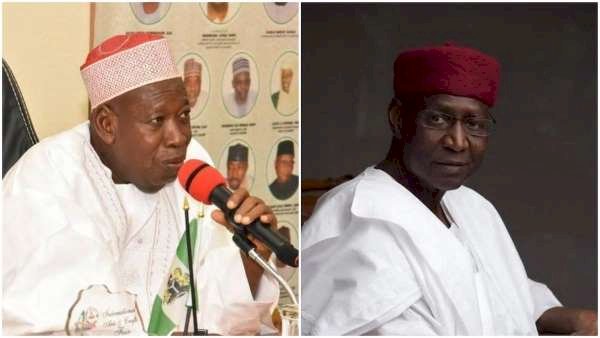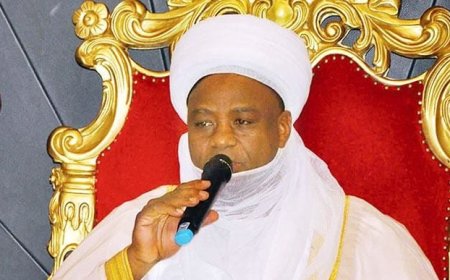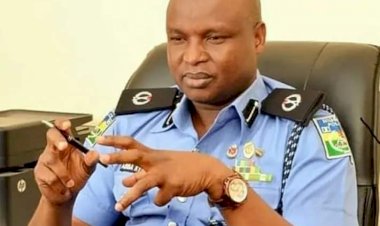Tributes, Gov Ganduje and Kano Works commissioner Magaji

April 26, 2020 The Nation News
By Idowu Akinlotan
WHEN Muazu Magaji, an engineer and until two Saturdays ago Kano State Works and Infrastructure commissioner, took to his Facebook page to pass subtle but obviously disagreeable comments on the passing of President Muhammadu Buhari’s chief of staff, Abba Kyari, he could not have been so naive as not to know that his post had become a red rag to a bull.
Not only did he stir a hornet’s nest, the governor of the state, Abdullahi Ganduje, promptly relieved him of his position. Until his attention was drawn to it, it is unclear whether the governor read his commissioner’s brutally frank comments on Mallam Kyari.
It is even less clear why Mr Magaji commented so hastily, and why he thought his comments would not attract punitive responses from either Kano or Abuja. Mr Magaji’s sacking illustrates vividly the perils of candid obituaries.
Though he has tried to put a spin on the cryptic messages he passed on the late presidential aide’s person and style, and has indicated how remorseful he felt that those messages were misunderstood, he left a hint in his comments to show what he regretted more in the post: the misinterpretation rather than the messages.
Except investigative reporters avail the public of the true feelings of the state government, there is not enough in their official statement relieving Mr Magaji of his appointment to indicate whether they thought he mirrored what many radical Kanawa politicians privately felt about Mallam Kyari, especially his style and his quiet but imperial mix of conservatism and pragmatism.
Kano’s Information commissioner, Muhammad Garba, told the public that Mr Magaji’s removal resulted from his “unguarded utterances against the person of the late Chief of Staff to the President, Malam Abba Kyari.”
As he put it, “The action of a public servant, personal or otherwise, reflects on the government, and, therefore, the Ganduje administration would not tolerate people in official capacities engaging in personal vendetta or otherwise.
Mr Kyari led a life worthy of emulation by serving his country to the best of his ability.”
The media is well aware of the perils of unguarded social media comments. Newspapers and electronic media have been put in trouble by the carefree comments of some of their staff members, many of whom in the heat of writing their ‘candid’ impressions quite easily forget that they are quasi representatives of their media establishments.
This lesson was also lost on one of the sons of Kaduna State governor, Bello Nasir el-Rufai, when he took to Twitter to belabour a Cross Riverian, whom he assumed was Igbo, for dismissing the Buhari presidency as incompetent and absentee.
In the heat of the exchange between the two, the sufficiently provoked younger el-Rufai made the cardinal mistake of threatening to gang-rape the offender’s mother, prompting many critics to suggest that he could not threaten what he was not capable of.
Then he capped his post with snide and exceedingly prurient ethnic aside on the Igbo people. Worse, Kaduna State’s first lady and mother of Mallam Bello, Hadiza el-Rufai, hedged for days before eventually disavowing her son’s unacceptable behaviour and apologising on his behalf.
Social media is riddled with landmines. It neither forgets nor forgives. It calls to remembrance sins and offences of years past, and it tears to ribbons reputations carefully garnered over decades.
Only last year, at a book launch in Abuja, the senior el-Rufai promised social media bullies and vagrants that the long arm of the law would catch up with them despite being hundreds of kilometres away from where the consequences of their provocative comments are felt.
He had said: “We should not confuse freedom of expression with freedom to kill. If you tweet something that is fake or you tweet something that is reckless without checking and it leads to the death of people, then you deserve to be tried at least as an accessory before or after the fact of murder…
You cannot sit in Port Harcourt or Lagos and start posting stuff that leads to societal instability in Kaduna and we let you go. We will file charges, we will go and collect you from Port Harcourt or Lagos and bring you before a judge in Kaduna and the judge will decide whether you are guilty. We’ve done that two or three times.
The people we have done this to are still being prosecuted.”
Gov Ganduje has sacked his Works and Infrastructure commissioner for his indiscretion. Even after the Kaduna State first lady had apologised on behalf of her family and son, women groups have continued to campaign for the younger el-Rufai to be charged in court for violating both the Cybercrimes (Prohibition) Act, 2015 and the Violence Against Persons (Prohibition) Act, 2015.
The campaign is still on, and it is not clear how it would be resolved, or whether it should be resolved outside the courts. Mr Magaji has wisely tried to bury the controversy that surrounded his post on the late Mallam Kyari.
He has written a lengthy and unconvincing public apology that tried to pour balm on the injured feelings of the grieving Kyari family, and he has reiterated his loyalty to the Kano governor, despite the sack.
The matter is unlikely to go beyond that point in the short to medium term, despite the candour of his views on the late presidential aide, and despite his poor attempt at self-abnegation.
Mr Magaji’s Facebook post, particularly his subtle character reference of Mallam Kyari, was thought to be in bad taste in some circles. But at a time when many roaring tributes to the late presidential aide had suffused the media, it is reassuring that a contrary opinion of the deceased, as a man of many parts viewed from different and hostile perspectives by so many people and interest groups, was ever penned from unlikely quarters.
The Kanawa are sometimes controversially regarded as culturally frank and politically radical. It is, therefore, significant that someone of the rank of a commissioner wrote frankly about what he thought of the late Mallam Kyari. Mr Magaji insists he was misunderstood and his narrative twisted by mischief makers, but there is little elbow room to really interpret his post other than literally.
Here are a few of his comments found particularly offensive, as reproduced by a newspaper based in the North:
(1) “Abba Kyari is no ordinary citizen. He amassed so much power that decided the fate of my nation and its people…Hence his death is never personal.” (2) “Nigeria is bigger than any individual…While praying for the president’s late support staff…Ours is to prevent a repeat of his non-accountable, domineering era!” (3) “There is a world of difference between a good person and a good leader…Leadership is an aggregated quality of mass empathy, not personal favours!” (4) “May Allah heal Abba Kyari…
But may Allah not return him as Chief of Staff…PMB needs to be his own man.” (5) “It’s very important we put things in perspective so that we can save our system from punitive unconstitutional usurpers in the future! Democracy & democratic equity does not by itself strive..
It must be guarded and protected… One person, just one person can set a dangerous precedence! When you are all done with the pretence and crocodile tears, we will do a review in overriding interest of the Nation and its people!”
Denounced for being unfeeling, Mr Magaji, while not denying the comments attributed to him, declared in somewhat tortured prose : “As a Muslim and a patriotic Nigerian, I was only misunderstood by people to think that I celebrated Kyari’s death; the truth is I did not.
Not only that, I made several posts mourning Kyari’s death on my same Facebook account and through my special assistants, but the general public couldn’t commend such or claim I did such post, rather tend to capitalize on a full-phrase post that is given another set of definition and direction as well as negativity in other to tarnish my reputation as a member of H.E. Dr. Abdullahi Umar Ganduje Administration.”
He continued: “On the other hand, Nigeria equally has the opportunity to restructure the office of the Chief of staff, where I called Mr President to ensure that we can (turn) the pandemic challenges into more strengths, by decentralising the power of the office for a rapid administrative flow, which over and above anything, our constitutional democracy is meant to achieve… T
hey (critics) twisted the narrative with explanation completely taken out of context and lacing it with religious and cultural connotations that made it necessary for our principal the governor to show leadership and solidarity with the dead by relieving me off my position in Kano State as his Commissioner of Works and Infrastructure.”
Since then, other notable personalities have written tributes to the late Mallam Kyari, most of them extolling his virtues, but managing in the same breath to present an incomplete picture of his strengths and weaknesses, a picture redone and reanimated by Mr Magaji’s portraiture.
The tributes written by both the president and his nephew, Mamman Daura, the former editor who mentored Mallam Kyari and is regarded as very influential in the corridors of power, have been the archetype. The president describes his late aide as the “very best of us…made of the stuff that makes Nigeria great.”
In his tribute, the president indicated he was aware of the criticisms levelled against Mallam Kyari, in response to which he rose in instinctive defence. He did not indicate any shortcoming of his aide worth mentioning. Said President Buhari: “…
There was never any question Abba would bring his first-rate skills and newly acquired world-class knowledge back to Nigeria which he did immediately upon graduation. Whilst possessing the sharpest legal and organisational mind, Abba’s true focus was always the development of infrastructure and the assurance of security for the people of this nation he served so faithfully.
For he knew that without both in tandem there can never be the development of the respectful society and vibrant economy that all Nigerian citizens deserve. In political life, Abba never sought elective office for himself.
Rather, he set himself against the view and conduct of two generations of Nigeria’s political establishment who saw corruption as an entitlement and its practice a by-product of possessing political office.
Becoming my Chief of Staff in 2015, he strove quietly and without any interest in publicity or personal gain to implement my agenda…” In this fulsome tribute, said many critics, is embedded the reason the president was judged to have abdicated the throne to his aide.
But Mallam Daura, a former editor and managing director of the New Nigerian Newspapers, was even more effusive in his tribute. “Malam Abba Kyari was a man blessed with mountainous gifts and uncommon attributes of intelligence, diligence, hard work, loyalty to friends and worthy causes,” began Mallam Daura.
“One could exhaust superlatives to do him full justice…Despite holding firm views, his advice to the President was dispassionate, even-handed and did not hide unpleasant facts, in the best traditions of public service. In point of intellect, he stood above all Ministers and Special Advisers in this government.
But personally he was modest, ever willing to learn, ever willing to help others.” Neither the president nor Mallam Daura resorted to the social media nor made snide remarks about the departed presidential aide.
They will not recant anything, as Mr Magaji has seemed compelled to do, no matter what anybody says about the tributes, whether regarding the president’s superlative description of his late aide as “the very best of us” or Mallam Daura’s extraordinary ranking of the departed as having “stood above all ministers and special advisers in this government” on point of intellect. And the ministers can go eat their hearts out.
Perhaps now Mr Magaji can better understand why Mallam Kyari seemed to loom very large over the Buhari administration, why he could do no wrong as it were, and why all the powers of the president, if not the reins of the presidency entirely, seemed to have been ceded to him when he held sway.
The former Kano State commissioner was baffled by the accretion of power in the hands of Mallam Kyari. He knew nothing. In the president’s circle, the late aide was gifted and incomparable, probably reverenced more than anything else for his clear baritone voice, measured cadence, awe-inspiring eclecticism, global exposure, and telling inscrutability.
Had he lived through the entire frame of the Buhari presidency, no one would have threatened the position of an aide who was expected to deify his boss and mentor, but who was paradoxically deified by them for his intellect and parsimoniousness.
Didn’t the first lady and the national security adviser know about this presidential predilection before they attempted lecturing him during their tiffs? Mr Magaji could be forgiven for staying far away from the main theatre of power and scribbling furiously on his Facebook wall; but what could anyone say of the hostile denizens in Aso Villa who, not being ignorant of the shenanigans of the villa, decided to bait the tiger?
Most Nigerians will probably gravitate towards the former Kano commissioner’s dismissive characterisation of Mallam Kyari. But they will be kicking against the stone and risking their health, as Mr Magaji has found out to his detriment.
Opinion is unevenly divided on the late presidential aide, and will remain so well after his replacement has been found. The new man will, however, be torn between following the footsteps of Mallam Kyari or being his own man, between satisfying the patrician longings of the president and his nephew or meeting the country at its devolutionary point of need.
How well the replacement walks a tightrope will in fact determine whether the president and his friends see the remaining years of his presidency as a dreadful ordeal or a refreshing conclusion to an uproarious era.
A few commentators have suggested that the chief of staff’s office be split in two to enable his deputy assume a part of that office’s onerous responsibilities, and thus probably end the paralysis in government, give leadership to the COVID-19 war, particularly balancing the policy of lockdown with reopening the economy, and imbue the government with the principle of inclusiveness that has been sorely lacking in the past few years.
It will, however, take a miracle to effect this change. Mallam Daura has in fact suggested that all future chiefs of staff might have to be judged against the benchmark of Mallam Kyari’s performance. That is a tough act to follow in the estimation of assessors who have declared the late aide incomparable.
Indeed, tons of social media vilification could not dent that benchmark, not even by someone as peculiarly acerbic and nuanced as the Kano social media nonesuch and former commissioner, Mr Magaji.


















































